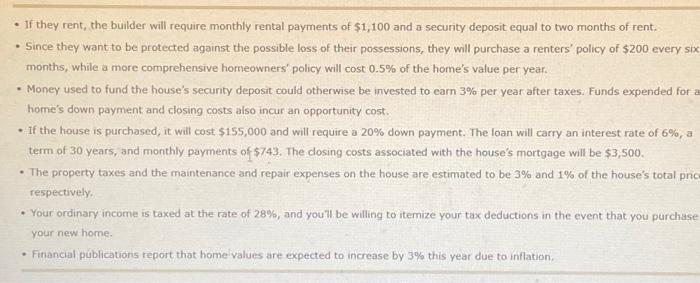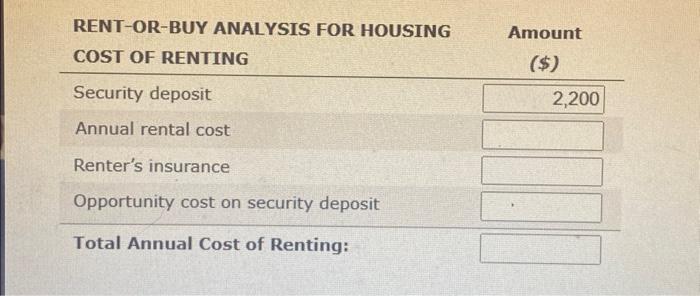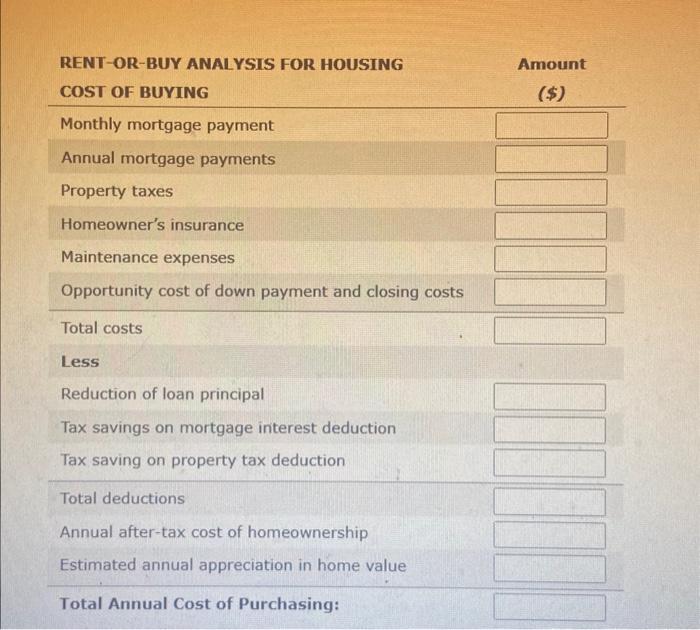- If they rent, the builder will require monthly rental payments of $1,100 and a secunty deposit equal to two months of rent. - Since they want to be protected against the possible loss of their possessions, they will purchase a renters' policy of $200 every months, while a more comprehensive homeowners' policy will cost 0.5% of the home's value per year. - Money used to fund the house's security deposit could otherwise be invested to earn 3% per year after taxes. Funds expended for home's down payment and closing costs also incur an opportunity cost. - If the house is purchased, it will cost $155,000 and will require a 20% down payment. The loan will carry an interest rate of 6%, a term of 30 years, and monthly payments of $743. The dosing costs associated with the house's mortgage will be $3,500. - The property taxes and the maintenance and repair expenses on the house are estimated to be 3% and 1% of the house's total pric respectively. - Your ordinary income is taxed at the rate of 28%, and youll be willing to itemize your tax deductions in the event that you purchase your new home. - Financial publications report that home values are expected to increase by 3% this year due to inflation. RENT-OR-BUY ANALYSIS FOR HOUSING Amount COST OF RENTING (\$) Security deposit 2,200 Annual rental cost Renter's insurance Opportunity cost on security deposit Total Annual Cost of Renting: RENT-OR-BUY ANALYSIS FOR HOUSING COST OF BUYING Monthly mortgage payment Annual mortgage payments Property taxes Homeowner's insurance Maintenance expenses Opportunity cost of down payment and closing costs Total costs Less Reduction of loan principal Tax savings on mortgage interest deduction Tax saving on property tax deduction Total deductions Annual after-tax cost of homeownership Estimated annual appreciation in home value Total Annual Cost of Purchasing: Amount (\$) Based on this analysis, Becky and her husband should: Purchase the home, as the total cost of purchasing is less than the cost of renting. Rent the home, as its total cost is less than the total cost of purchasing. Purchase the home, as the cost of purchasing is greater than the cost of renting. - If they rent, the builder will require monthly rental payments of $1,100 and a secunty deposit equal to two months of rent. - Since they want to be protected against the possible loss of their possessions, they will purchase a renters' policy of $200 every months, while a more comprehensive homeowners' policy will cost 0.5% of the home's value per year. - Money used to fund the house's security deposit could otherwise be invested to earn 3% per year after taxes. Funds expended for home's down payment and closing costs also incur an opportunity cost. - If the house is purchased, it will cost $155,000 and will require a 20% down payment. The loan will carry an interest rate of 6%, a term of 30 years, and monthly payments of $743. The dosing costs associated with the house's mortgage will be $3,500. - The property taxes and the maintenance and repair expenses on the house are estimated to be 3% and 1% of the house's total pric respectively. - Your ordinary income is taxed at the rate of 28%, and youll be willing to itemize your tax deductions in the event that you purchase your new home. - Financial publications report that home values are expected to increase by 3% this year due to inflation. RENT-OR-BUY ANALYSIS FOR HOUSING Amount COST OF RENTING (\$) Security deposit 2,200 Annual rental cost Renter's insurance Opportunity cost on security deposit Total Annual Cost of Renting: RENT-OR-BUY ANALYSIS FOR HOUSING COST OF BUYING Monthly mortgage payment Annual mortgage payments Property taxes Homeowner's insurance Maintenance expenses Opportunity cost of down payment and closing costs Total costs Less Reduction of loan principal Tax savings on mortgage interest deduction Tax saving on property tax deduction Total deductions Annual after-tax cost of homeownership Estimated annual appreciation in home value Total Annual Cost of Purchasing: Amount (\$) Based on this analysis, Becky and her husband should: Purchase the home, as the total cost of purchasing is less than the cost of renting. Rent the home, as its total cost is less than the total cost of purchasing. Purchase the home, as the cost of purchasing is greater than the cost of renting










